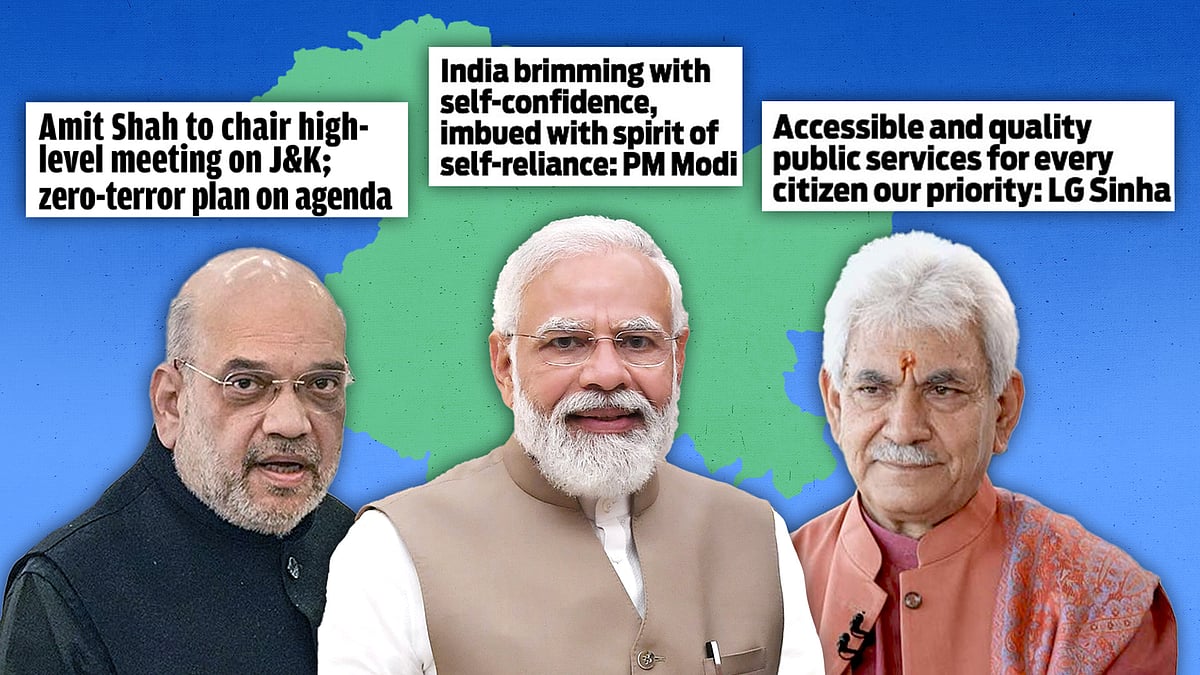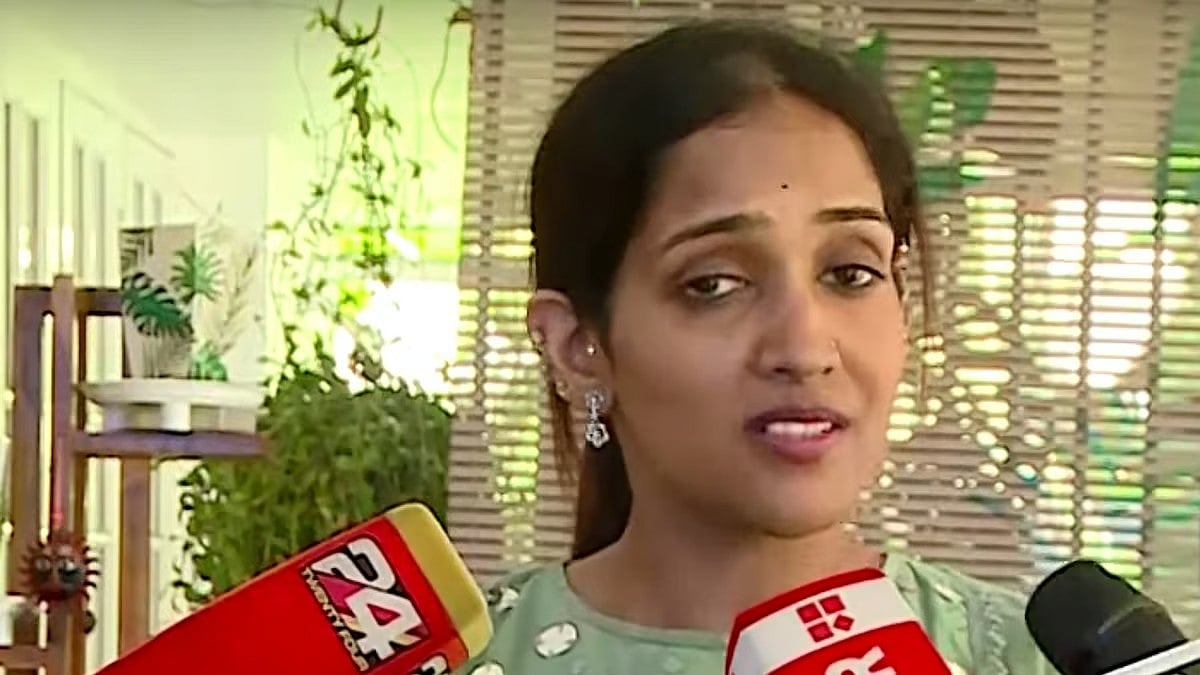‘No staff, defunct office’: Kashmir Times editor on ‘bizarre’ charges, ‘bid to silence’
Journalists say the raid on the head office of the Kashmir Times in Jammu has intensified the attack on the free press in the valley.
When Anuradha Bhasin first saw a video circulating on social media on Thursday – showing police personnel milling outside the Jammu office of the Kashmir Times – she didn’t quite know what she was looking at. There had been no official communication. No staffer had called her. She has none left there. And the office, she said, hasn’t been operational for three to four years.
“I don’t even know about the raids other than what I see in the videos,” said Bhasin, the managing editor of Kashmir Times, while speaking to Newslaundry. “There was nothing consequential in the office except rusted computers, some office documents, and archives. It’s a run-down space. I have no confirmation of anything apart from those visuals.”
On Thursday, the Jammu and Kashmir Police’s State Investigation Agency (SIA) carried out searches at the head office of the Kashmir Times in Jammu. An FIR was also reportedly filed against Bhasin and her publication, accusing them of propagating content allegedly detrimental to the country's sovereignty and a threat to public law and order.
But Bhasin said she was unaware whether anyone had been questioned.
“I don’t have staff there, so I don’t know who they have taken for questioning. The only person with the office keys was our previous manager, and we are unable to contact him. He sometimes checked the building voluntarily to get it cleaned. I have been out of the country, and we have mostly freelancers working for us,” she noted, while speaking to Newslaundry.
Responding to the “bizarre” allegations against them, Bhasin and editor Prabodh Jamwal issued a statement on their website titled, “SIA Raid: Another Attempt to Silence Us,” noting that they were being targeted for steadfastly upholding independent journalism.
“Since 1954, the Kashmir Times (whose founding editor was Ved Bhasin) has stood as a pillar of independent journalism. We have chronicled the region’s triumphs and failures with equal rigour. We have given voice to communities that would otherwise go unheard. We have asked difficult questions when others remained silent. We are being targeted precisely because we continue to do this work,” it said. The statement added that the accusations sought to intimidate, delegitimise, and ultimately silence the publication. “We will not be silenced,” they proclaimed.
Journalists from other organisations also reacted to the news. Seema Chishti, editor of The Wire, termed the raid “shameful”, while The Hindu’s diplomatic affairs editor Suhasini Haidar called it “politically motivated.”
Kunal Majumder, the Asia-Pacific program coordinator for the Committee to Protect Journalists (CPJ), said the raid was “deeply troubling,” and raised concerns about “increasing pressure on media outlets in Jammu and Kashmir.” He also sought the legal basis for the actions taken by the authorities against the publication in Jammu and Kashmir. “Authorities must clearly explain the legal basis for this action and ensure that any investigation is conducted with transparency and full respect for due process. News outlets should not face punitive action simply for doing their journalistic work,” he said.
Journalists in the Kashmir valley maintain that this raid is a continuation of the coercive landscape that took shape after the revocation of Article 370 in August 2019. “There is immense intrusion in our personal lives. Security agencies or the administration keep asking us about our personal lives and what kind of stories we are following,” one reporter said on condition of anonymity. “Under these circumstances, we have two options: leave journalism or go to jail.”
Despite these challenges and operating with skeletal resources, the Kashmir Times has recently reported on a variety of stories – the explosion at a Srinagar police station, shrinking job opportunities for young journalists, weakening Jhelum embankments after repeated floods, Rajya Sabha elections, PSA detentions, and protests in Ladakh. In fact, a day before the raid, a story it published won the Laadli Award. Freelance journalist Nidhi Jamwal was honoured for her article on what rural women can teach us about climate resilience.
Moreover, Thursday’s raid is not the first time that the news publication or its editors have come under attack from the state. In 2020, the estates department of the Jammu and Kashmir union territory administration sealed the Kashmir Times office in Srinagar. The publication went completely digital by late 2021. Bhasin said authorities have still not returned the equipment they seized then.
A year before that, she took the Modi government to the Supreme Court, challenging the prolonged internet shutdown imposed in August 2019, arguing it crippled press freedom and destroyed livelihoods. The court subsequently directed the government to review the curbs.
And this August, the Jammu and Kashmir home department banned 25 books – among them Bhasin’s A Dismantled State: The Untold Story of Kashmir After Article 370 – accusing them of spreading a “false narrative” and “secessionist sentiment.” The list also included A.G. Noorani’s The Kashmir Dispute (1947–2012) and Sumantra Bose’s Contested Lands.
Dismantling the free press
For many journalists in the valley, the raid on Kashmir Times is yet another signal of what the profession now entails.
“Earlier, it was mostly individuals. Now, it is organisations. In a way, the government is sending a message to media houses: fall in line,” said one journalist.
Newslaundry spoke with six journalists in the valley – all requested anonymity. “Talking to the media does not help,” one said. “At the end of the day, you have to go to the police station and attend court hearings. Our life does not change.”
Another journalist contrasted the current atmosphere with 2020, when the Srinagar office of Kashmir Times was sealed: “Back then, journalists under attack would speak up. But that has changed in the last four to five years.”
Several journalists said they now receive background-verification calls from various government offices multiple times a month, asking them to disclose PAN and Aadhaar numbers, bank account details, salary slips, property records, and even their marital status.
“They want our entire lives on file,” one reporter said. District public relations officers, they added, have been tasked with compiling personal and financial details of working journalists. Those linked to foreign media or independent Indian newsrooms face the most scrutiny, while “Facebook journalists who peddle propaganda” are rarely questioned.
Earlier this month, Lieutenant Governor Manoj Sinha even directed district authorities to “weed out fake journalists,” after a misleading video circulated online. Reporters fear that such directives will further legitimise arbitrary checks against the press.
‘Journalism will vanish’
For many, the raid on Thursday underscored a broader effort to extinguish independent voices. “Journalism here is no less than fighting on a battlefield,” one said. Another added that the pen “no longer has the might it once possessed.”
Beyond surveillance and interrogation, financial coercion has become a key tool. The sudden halt of government advertisements to certain newspapers is widely seen as punitive.
“When the ads stop, the newsroom shrinks. Then layoffs start. This is how they dismantle the media,” a reporter explained.
The cumulative effect has been devastating. Since August 2019, dozens of journalists have left the profession, moved out of Kashmir, or withdrawn from reporting altogether. “If this continues, journalism in the valley will vanish from history pages,” one journalist said.
Throughout these conversations, the names of Sajad Gul, Asif Sultan, Fahad Shah and others surfaced repeatedly – each having faced UAPA or PSA cases. “Everyone knows the cost of speaking now,” a journalist said. “The cost could be your job, your freedom, or your family.”
Newslaundry sent questionnaires to the offices of Lieutenant Governor (LG) Manoj Sinha and Director General of Police (DGP) Nalin Prabhat about the raid on Kashmir Times on Thursday. This story will be updated once we receive a response from them.
If the government can hike print ad rates by 26 percent, we can drop our subscription prices by 26 percent. Grab the offer and power journalism that doesn’t depend on advertisers.
 Modi govt spent Rs 70 cr on print ads in Kashmir: Tracking the front pages of top recipients
Modi govt spent Rs 70 cr on print ads in Kashmir: Tracking the front pages of top recipients ‘Got two brothers from Kashmir,’ says daughter of Pahalgam terror victim
‘Got two brothers from Kashmir,’ says daughter of Pahalgam terror victim